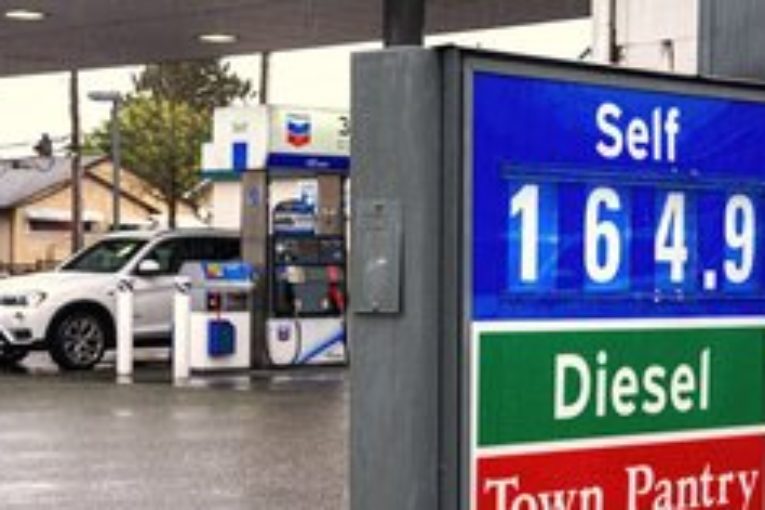
After B.C. gas prices spiked to record highs in April, the John Horgan government ordered an inquiry in what causes gas prices in Vancouver to be higher than anywhere else in Canada.
In its final report issued on Friday, the BC Utilities Commission (BCUC) said spikes in gasoline prices in Vancouver appear to be “choreographed.”
Generally, BCUC was puzzled by an unexplained difference of about $0.13 in the wholesale gas price that it could not explain.
“There is an unexplained difference in wholesale price of approximately 13 cents per litre (cpl) between Metro Vancouver and the US Pacific Northwest,” the commission said.
“We cannot find a specific trigger in 2015 that would explain the beginning of this disconnect.”
B.C. Jobs, Trade and Technology Minister Bruce Ralston said the commission’s report confirms that wholesale gas prices in B.C. are not competitive.
“People feel like they’re being ripped off when they fill up at the gas station, and they’re right,” Ralston said.
The commission was asked by Premier John Horgan to get to the bottom of gasoline price spikes in B.C. in May, after gas prices spiked as high as $1.72 per litre in Vancouver in April.
Gas prices have since fallen more than $0.30 per litre. The average price in Vancouver on Thursday, August 29 was $1.47 per litre, and lowest price was $1.28, according to Gasbuddy.com. But prices are already up by about $0.05 per litre today – just in time for the long weekend and the BCUC’s final report.
BCUC commissioner David Morton said there are certain differences in prices for B.C. compared to other parts of Canada that remain “unexplained.” The commission has found that the market is not functioning properly.
As part of its inquiry, the BCUC commissioned studies and compelled oil and gas companies and refiners to answer questions posed by interveners and explain why gas prices are so high in B.C. compared with other parts of Canada.
The BCUC was explicitly told by the Horgan government not to consider provincial policies, like taxes or its low carbon fuel standard, as part of its inquiry, but that didn’t stop companies like Parkland Fuel Corp. from pointing to those policies.
Parkland and others, like Suncor Energy, also pointed to a highly constrained Trans Mountain pipeline as contributing to the problem. Since 2015, more crude and less refined fuels have moved on the Trans Mountain pipeline, which means obtaining more refined fuel products like gasoline, diesel and jet fuel by truck, train and barge, and from “marginal” suppliers in the U.S. – all of which increases the wholesale price.
“With the supply of refined products shipped via the Trans Mountain Pipeline having been sharply constrained since 2015, B.C. demand has been met by ever more expensive sources of supply from as far away as California, the US Midwest and the Gulf Coast,” Parkland, which operates the only refinery in the Lower Mainland, wrote in one of its submissions.
“In other words, the marginal source of supply is now a more costly source of supply, and the wholesale price has increased correspondingly. New costs imposed on marketers supplying the BC market, such as those associated with BC’s low-carbon regulatory requirements, has only amplified this effect.”
Supporters of the Trans Mountain pipeline expansion argue that the twinning project would free up more space on the existing line for more refined fuels from Alberta, thus lowering their price.
Robyn Allan and Marc Eliesen have argued the expansion isn’t necessary because there is already under-utilized capacity on the Trans mountain pipeline.
In their submissions to the BCUC, they relied on National Energy Board (NEB) data from 2014 to argue that the Trans Mountain pipeline has a capacity of 400,000 barrels per day, and that it is not operating at capacity.
“Trans Mountain’s apportionment process is fundamentally flawed resulting in unused capacity,” they wrote.
Both the NEB and Trans Mountain responded bysaying that is not the case. The NEB stated that a graph it had produced in a 2014 on pipeline capacity, which Allan and Eliesen relied on, was “theoretical” not a reflection of the volume that actually moves on the pipeline.
If no crude moved on the pipeline, then its capacity for refined fuels could be as high as 400,000 bbls/d, but that’s not a reflection of what actually moves on the pipeline.
Trans Mountain pointed out that, as the operator of the pipeline, it was “in the best position” to verify data on what types of fuels and volumes move on the pipeline.
“Trans Mountain confirms that the capacity allocation rules do not result in unused capacity and the pipeline capacity is fully-utilized,” Trans Mountain writes.
Based on evidence given by Trans Mountai and the oil companies that use it, the BCUC concluded “that no weight can be given to Allan and Eliesen’s assertions with regard to the pipeline not operating at full capacity.”
The NEB was asked if it would be possible to increased the amount of refined fuels moving on the pipeline, or the amount of light crude Parkland needs for domestic refining. The NEB said it was entirely possible, but pointed out that it is the shippers who pay for pipeline capacity that decide what products to ship on the pipeline.
Morton said that there is no guarantee that an expanded Trans Mountain pipeline will necessarily mean more refined fuels and lower prices. The way the products are allocated would have to change.
Only 4% of the gasoline is imported to B.C., but “it’s the price of that that sets the market price,” Morton said, which suggests that even if more refined fuel products became available, prices would still be vulnerable to prices in the Pacific Northwest.
The price differential is costing British Columbians an estimated $490 million each year.
You can read more of the news on source
